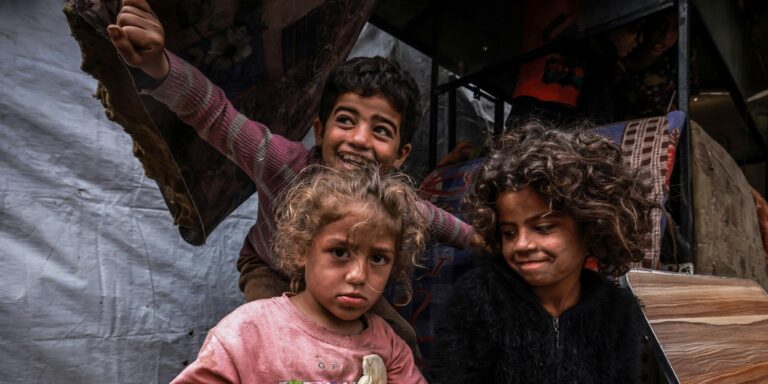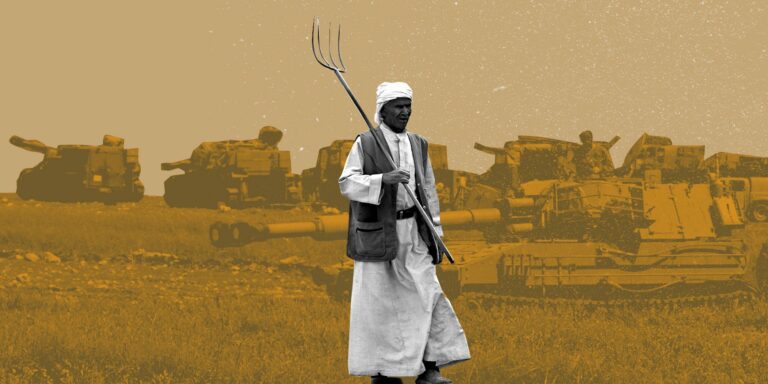Marwan (27) is one of the dozens who suffer from nervous and mental problems in Mosul, and whose families have deliberately locked them in their homes fearing that they would hurt themselves or the others. This happened in the light of the city’s lack of health centers that could provide them with treatment and psychological care with the required patience, leading to the escalation of violations they suffer from, and the deterioration of their condition, as a result of their confinement.
“He was lying near the window when the explosion happened and the glass scattered over him. Since then, he has never been the same as we knew him.”
With these words, Marwan’s father (57) described the changes that occurred to his son as a result of the mortar bomb that fell on the yard of their home in al-Aqeedat neighborhood of the old city. This took place when the phase of liberating the right side of Mosul began in early 2017, as the last ISIS fighters were trapped there.
Marwan, who has dark skin and a light beard, was lying silently on a bed in the basement, smiling from time to time, before he adjusted his sitting posture when an iron chain tied to his left ankle appeared, while the other limb was tied to a ring in one of the basement’s corners. His father added: “We did not notice what happened. The war had started and bombs and rockets fell upon the houses like rain. However, as the hours passed, and when we got used to the fear, we discovered that Marwan had turned into someone else, he started acting differently, uttering incomprehensible words and he became so aggressive.”

The family that consists of the two parents and three sons, the eldest of which is Marwan, survived after taking the risk of going out and fleeing through the city’s alleys, and eventually being caught by the Iraqi security forces. It happened only a few days before their small house was knocked down, similar to what happened to about 11,000 other housing units that were destroyed by the war in the old city.
The mutual bombardment and attacks with different arms lasted for weeks and caused the burial of thousands, including entire families, under the rubble, in addition to years of stories of murder, kidnapping and torturing at the hands of ISIS fighters resulted in psychological impacts on hundreds of the city’s residents. Those impacts require a special care that is not provided in the city where the hospitals and the public health centers which provide basic services are still awaiting reconstruction and rehabilitation.
The father took a deep breath while looking with his healthy left eye at his son, since he lost the other when his son hit him with a hard blow when he blocked his way during one of his repeated escape attempts, and said: “He has a problem in his brain and needs expensive medicines that I cannot afford because I am unemployed. We lost our home and the little things we had because of the war. I can barely pay the rent of this house where we moved in. We have no choice other than locking him in this basement and I am afraid this will continue for a very long time.”
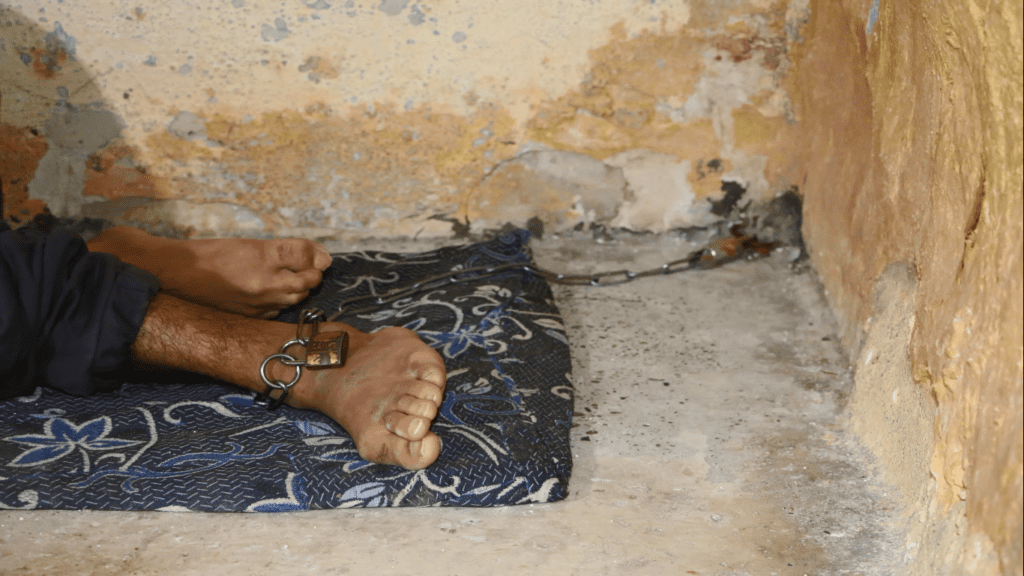

The war is over and the firing stopped, but Marwan is still living it within the four walls of his prison. The ravages of war are still happening inside his head and he expresses them with sudden movements and convulsions, similar to what happened on that day when the bomb exploded. Then he gets calm again and starts to laugh while crying. Marwan, like many others, lives under horrible conditions while being held in chains. The suffering seems to be more complicated when it comes to the parents who are not aware nor able to deal with such cases.
The father said with a trembling voice: “The war is over. Many have lost their children, healed and overcame their sorrow. But our wounds are never healed … we die every day seeing him like this.”
The Lack of Treatment Centers
Dr. Asmaa Ghanem Hussein, a consultant psychiatrist, commented on Marwan’s case and noted that he is suffering from a severe condition that “needs long-term admission to a specialized center that provides him with treatment and medical follow-up through an integrated medical team that includes a physician and a psychiatrist.”
She warned that locking and chaining him is wrong and will worsen his situation, and that it is also considered a violation of the human rights that include the right to proper treatment. “Marwan’s family had to lock him as he represents a danger to them and to himself. Unfortunately, there are no treatment centers nor specialized hospitals for such cases in a big city like Mosul where 2 million people live. In the whole country, there is only al-Rashad hospital in Baghdad that specializes in long-term psychological treatment.”
“The same happened to him when he was 6 years old.” Said Marwan’s mother while giving him a plate of apples that he grabbed happily.
“He was with his cousin when he fell on his head from the outer wall of the house they were climbing. Then he experienced times when he trembled and his body stiffened. Some doctors said he suffered from epilepsy, others said it was because of the effect of the head trauma. He did not fully recover but became much better as months and years passed, until that tragic day.”
She looked at him tenderly and he laughed out loud. She added: “Every day I tell myself that today I will open the door and he will be okay. Even if he did not fully recover, I just want him to at least be able to do some things independently. His father and I won’t be around forever.”
Every day, his family gives him the medicines recommended by the last doctor he saw which are mere sedatives, that are losing its efficiency and potency by time due to his worsening condition.
To justify chaining and locking him in the basement, Marwan’s mom said with a trembling voice looking away before she looked at him again: “He tries to escape home .. His last attempt happened two months ago. Once I freed his leg from the chain, he pushed me so hard and ran away. Two days later, we found him with the help of our neighbors and he was devastated. He does not realize what he is doing.”
In addition to that one successful escape attempt, there were several failed ones. Some of them were prevented by the locks on the external door that is always closed just in case. Also, the father had thwarted one of the escape attempts which caused his eye a permanent disability.
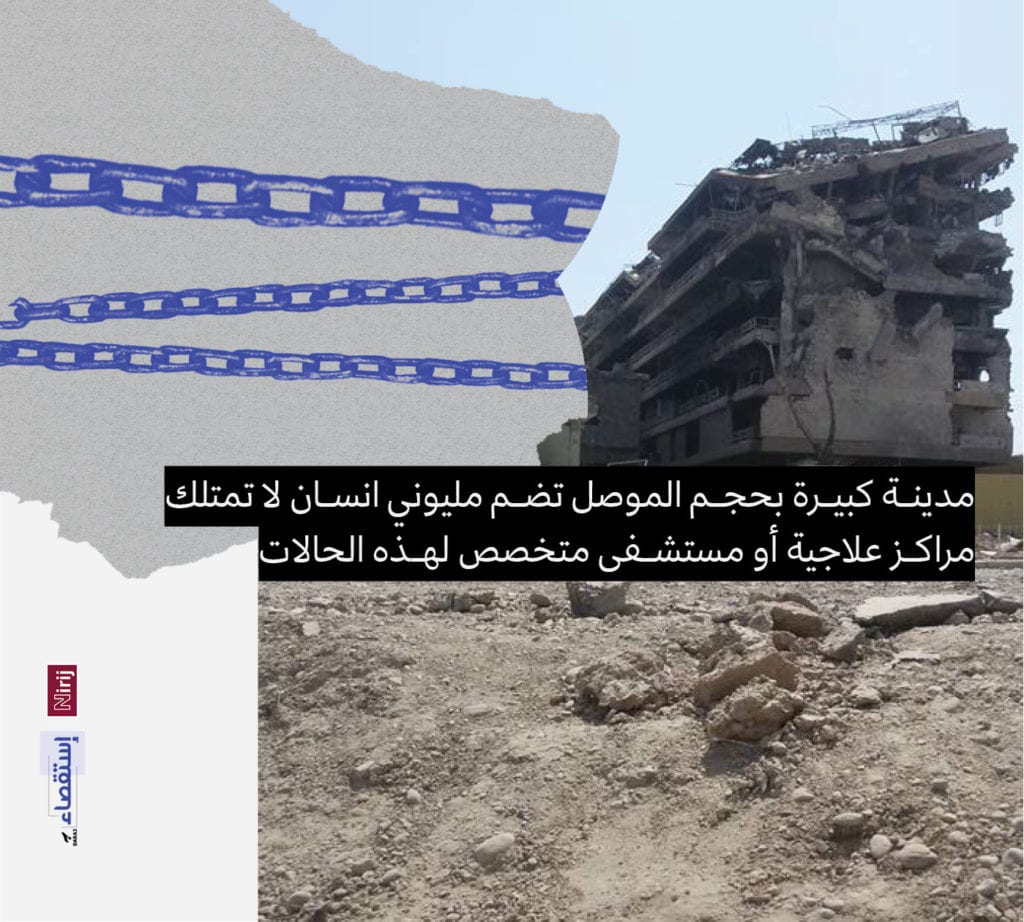

Society’s View
Marwan reiterated his mother’s name while sitting cross-legged on his bed near the basement’s yellow colored wall which had eroded due to humidity conditions. His mother noted that this is his way to show that he needs something. She was in tears before pulling herself together and said: “If we let him out, people would dub him crazy, and they will call our house “The house of the crazy.” Besides, he may hurt somebody, and we will be held responsible. And if we keep him like this, they would say: “Such a heartless family, they locked their son up in the basement and tied him with chains like an animal.”
A painful story that is shared by all the families of the mentally-retarded and disabled people. As they bear the burden of the arduous care of their children, they try, as much as they could, to avoid the society’s harsh view. Therefore, they would rather keep them at home under direct control, away from the prying eyes, and the looks of pity, fear, and chock.
In the pre-war Mosul, there were several mental health centers, most notably, the one in al-Mohandessin neighborhood, northeast of the city, which now became out of service. On the other hand, the city’s hospitals which survived the devastation have three psychological departments and provide temporary treatment. Yet, it is not well-equipped to attend to chronic cases.
The calamities of war and the harsh economic situation had cast its dark shadow over the families’ lives owing to their losses of houses and properties. This grim reality coupled with low health, psychological knowledge, and abject poverty had led families to deal with persons with disabilities in this way, that is, to quarantine them and tie them with chains.
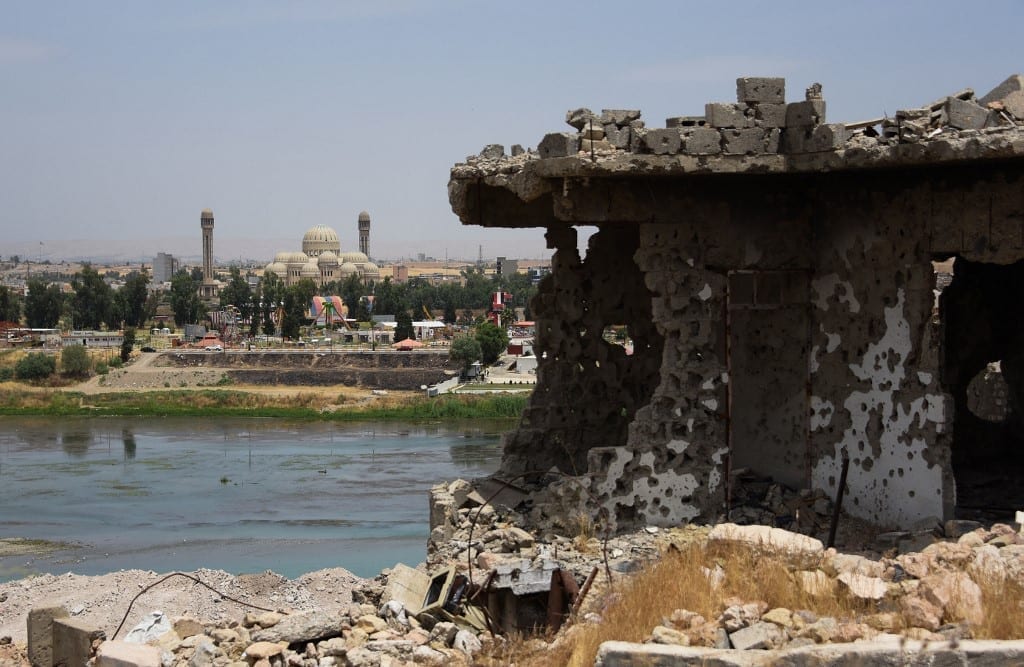

Imprisoned Inside The Yard
Young Fayez’s family, who lives in the Tayaran neighborhood on the right side of Mosul, had been struggling with this situation for ten years. Unlike Marwan, Fayez’s family doesn’t tie him with chains but rather closes the rooms’ doors of his oriental-style house that overlooks a wide-open yard. They also lock the outer metal door with a padlock, giving him the freedom to roam indoors for hours and hours without being tired or bored.
The father, who works as a carpenter, is trying to hold a dim light of hope to get his son out of the bottomless abyss of illness he had fallen into. Yet he complained about the scarcity of any specialized medical center where he could seek help. Moreover, The doors he knocked asking for help only gave him a handful of sedatives which is not enough, as he said.
His voice faded, then he said: “He is now over twenty. Sometimes I feel pity for him and I open the outer gate so that he could get out without control, but he just shakes his head and goes back to spinning around.”
The doctor who supervised Fayze’s case suggested that it is a hereditary illness, as the history of his family refers to a similar case of next-of-kin (his uncle). According to Fayez’s father, the doctor did not rule out the possibility of brain damage that infected him while he was a fetus in his mother’s womb.
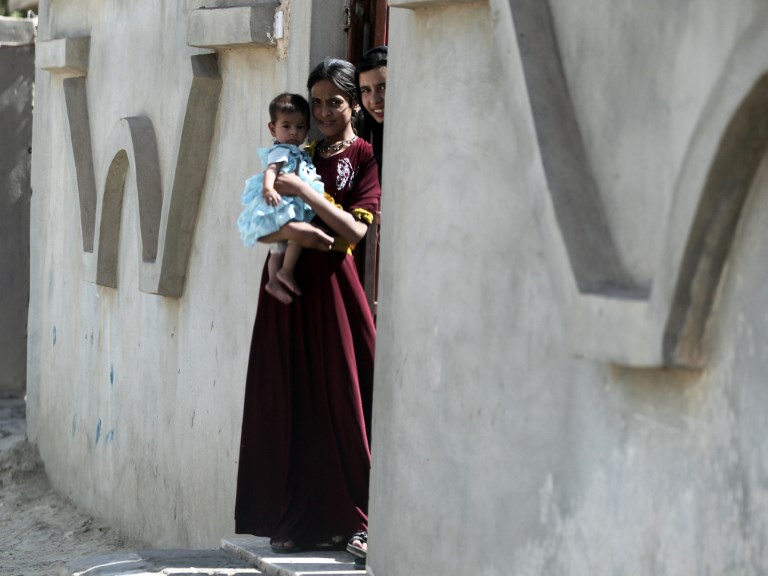

Girls’ Cases Kept in the Dark
Waad Mahmoud, the social researcher, noted that the families often keep the mental cases of their members secret, especially if they were females, due to what he called social embarrassment. This means there are many concealed and hushed cases with restricted freedoms despite their urgent need for medical treatment.
He added that in a city like Mosul, with a conservative nature to the extent of being extremist in some matters, such as marriage, the family history is thoroughly ferreted out before a person comes to ask a girl for marriage. Men avoid marrying girls from families with a history of mental illness, for fear of the genetic factor and its transmission to the offspring.
Mahmoud pointed out that there are desperate families who knocked on the wrong door, and sought the help of clairvoyants and sorcerers under the pretext that their problem is caused by demonic possession or evil spirits. As a result, the situation gets worse. They turn a deaf ear to the fact that it is a mental illness like any other illness that requires treatment and medical follow-up.
Due to the absence of specialized treatment centers and because the families put a lid on mental illness cases, no authority could give accurate figures of these cases, but some estimated them to be hundreds.
Imprisoned In The Camp
In a poor and illiterate environment, people are confused about different cases. For instance, those who suffer from autism could harness their capabilities in several areas and some of them may excel. Yet, all cases here are dealt with as if they suffer from the same disorder. The ill-treatment in these special cases increases when the victim is a girl.
In Hasan Shami camp for persons with disabilities in the east of Mosul, the father of a Zahr the teenager (14 years), who suffers from autism, did not find a solution to curb her hyperactivity, except for tying her to a metal chain inside a tent next to the family’s tent. He sits on a bench outside to guard her all day.
The chain that encircled Zahr’s waist and tied her to the tent’s iron structure gave her a space barely to move within, not exceeding two meters in diameter, that was the world in which she lived. The father, who is a retired employee, says that his heart goes for his daughter, but he has no choice but to imprison her for fear of something much worse than her illness, as he justifies.
Her father was referring to his fear of her being sexually harassed. In the absence of specialized psychological treatment centers, the likes of Marwan, Zahr and Fayez will have no shelter but the street and will turn homeless if their families lose their patience, which is the case of others stray in the alleys of Mosul, but without care or shelter, They are threatened and abused by disease and hunger. The city has witnessed many of them during the past few decades as a result of negligence and successive wars, and most of them disappeared in the liberation battles from “ISIS” with their fate unknown.
The report was made with the support of the Nirij Investigative Journalism Network.


